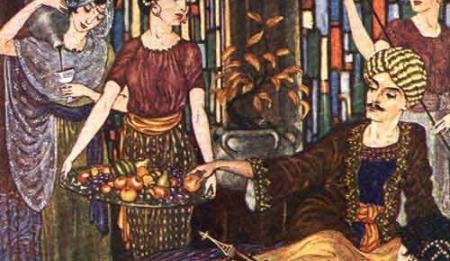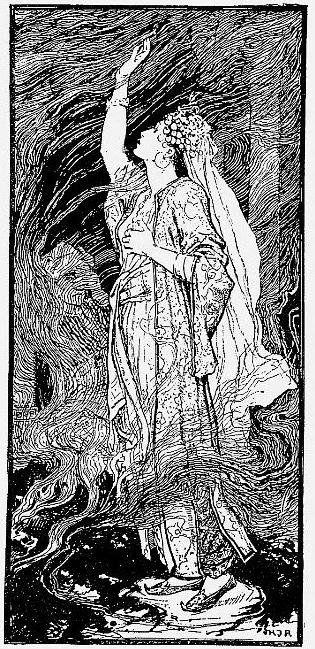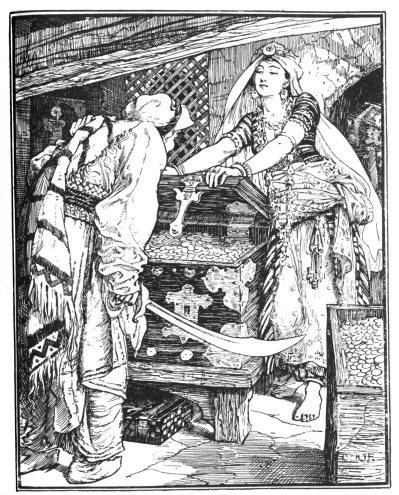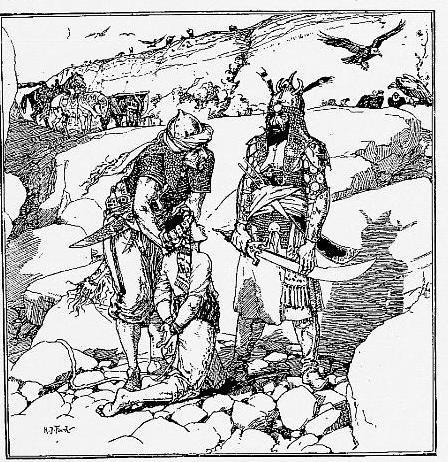14.Story of the Third Kalendar, Son of a King
My story, said the Third kalendar, is quite different from those of my two friends. It was fate that deprived them of the sight of their right eyes, but mine was lost by my own folly.
My name is Agib, and I am the son of a king called Cassib, who reigned over a large kingdom, which had for its capital one of the finest seaport towns in the world.
When I succeeded to my father’s throne my first care was to visit the provinces on the mainland, and then to sail to the numerous islands which lay off the shore, in order to gain the hearts of my subjects. These voyages gave me such a taste for sailing that I soon determined to explore more distant seas, and commanded a fleet of large ships to be got ready without delay. When they were properly fitted out I embarked on my expedition.*****
13.The Story of the Envious Man and of Him Who Was Envied
In a town of moderate size, two men lived in neighboring houses; but they had not been there very long before one man took such a hatred of the other, and envied him so bitterly, that the poor man determined to find another home, hoping that when they no longer met every day his enemy would forget all about him. So he sold his house and the little furniture it contained, and moved into the capital of the country, which was luckily at no great distance. About half a mile from this city he bought a nice little place, with a large garden and a fair-sized court, in the center of which stood an old well.
In order to live a quieter life, the good man put on the robe of a dervish, and divided his house into a quantity of small cells, where he soon established a number of other dervishes. The fame of his virtue gradually spread abroad, and many people, including several of the highest quality, came to visit him and ask his prayers. *****
12.The Story of the Second Kalendar, Son of a King
“Madam,” said the young man, addressing Zobeida, “if you wish to know how I lost my right eye, I shall have to tell you the story of my whole life.”
I was scarcely more than a baby, when the king my father, finding me unusually quick and clever for my age, turned his thoughts to my education. I was taught first to read and write, and then to learn the Koran, which is the basis of our holy religion, and the better to understand it, I read with my tutors the ablest commentators on its teaching, and committed to memory all the traditions respecting the Prophet, which have been gathered from the mouth of those who were his friends. I also learnt history, and was instructed in poetry, versification, geography, chronology, and in all the outdoor exercises in which every prince should excel. But what I liked best of all was writing Arabic characters, and in this I soon surpassed my masters, and gained a reputation in this branch of knowledge that reached as far as India itself.
Now the Sultan of the Indies, curious to see a young prince with such strange tastes, sent an ambassador to my father, laden with rich presents, and a warm invitation to visit his court. My father, who was deeply anxious to secure the friendship of so powerful a monarch, and held besides that a little travel would greatly improve my manners and open my mind, accepted gladly, and in a short time I had set out for India with the ambassador, attended only by a small suite on account of the length of the journey, and the badness of the roads. However, as was my duty, I took with me ten camels, laden with rich presents for the Sultan. ******
11.The Story of the First Kalendar, Son of a King
In order, madam, to explain how I came to lose my right eye, and to wear the dress of a kalendar, you must first know that I am the son of a king. My father’s only brother reigned over the neighboring country, and had two children, a daughter and a son, who were of the same age as me.
As I grew up, and was allowed more liberty, I went every year to pay a visit to my uncle’s court, and usually stayed there about two months. In this way my cousin and I became very intimate, and were much attached to each other. The very last time I saw him he seemed more delighted to see me than ever, and gave a great feast in my honor. When we had finished eating, he said to me, “My cousin, you would never guess what I have been doing since your last visit to us! Directly after your departure I set a number of men to work on a building after my own design. It is now completed, and ready to be lived in. I should like to show it to you, but you must first swear two things: to be faithful to me, and to keep my secret.” ******





